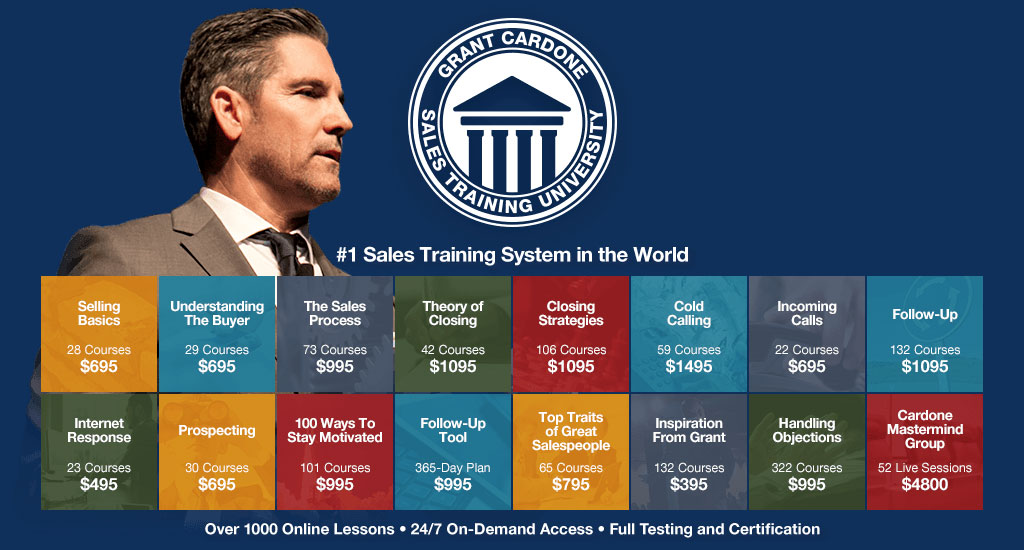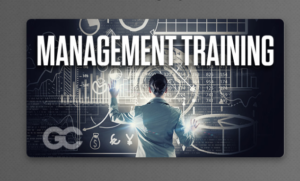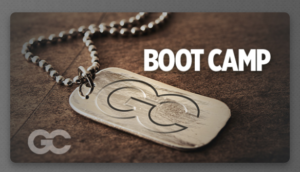
The Sales Manager’s Guide To Successful Cardone Training
If you’re a sales manager now and in a leadership position. Here’s the multi-million dollar question (literally). How do you use a program like Cardone University in a way that saves you time, keeps you inspired and motivated while simultaneously transferring skill and motivation to your salespeople?
Your #1 Problem (and the solution)
The biggest, in fact, most likely the only reason, people don’t sign up for Cardone University is that they don’t believe their people will use it. First, if they don’t have it, they can’t use it. Second, here are the three ways you will guarantee usage and successful Cardone training in order of importance.
- You use the program in the same way you expect them to do it. If the sales team agrees to and commits to 4 segments per day at the start of the shift, then you too need to do 4 segments per day at the start of the shift. Leading by example delivers a massive level of validation.
- Inspect what you expect. If the expectation is 4 per day, make sure that’s happening. We can send you a report every day letting you know who didn’t meet the expectation. There should be rewards and consequences for whatever decision a salesperson makes about how they chose to engage in the program. [Here’s a few Accountability Ideas]
- Use Cardone University with your team. We’ll get into this more later, but make sure Cardone University is incorporated into Sales Meetings, Group Training and One-On-One meetings.
The Perfect Morning Routine
How you start impacts how you finish, wouldn’t you agree? This morning routine was designed by Grant Cardone to give a manager what they need to have a successful day, week, month and year. But first a question: When the cabin loses air pressure and the oxygen mask drops, who’s mask goes on first? Yours, right? What’s the point?
If you don’t take care of you first, you can’t take care of anyone else:
- Wake Up Early [get up at a time that forces you out of your comfort zone]
- Write Your Goals Down [5 – 10 minutes]
- Read something inspiring from a book [20 minutes]
- 4-6 segments from Cardone University [20 minutes]
- Exercise/Move your body [15-30 minutes]
- Listen to closing material on the way to work [warm up]
- Have a “good news” only sales meeting [12-18 minutes / more on this later]
- Have your sales team PDR [practice, drill, rehearse / 12-18 minutes]
SIDE NOTE: What to do when you don’t have time?
No time means not a priority. Period.
“Good News Only” Sales Meetings
One of Grant’s stand alone messages and a “only” practice in our office is the daily sales meeting. You want these meetings to be “good news only” meetings. NO NEGATIVITY ALLOWED. If you need to do house keeping, do it in a one-on-one or at another time. Make sure to start the day from a place of positivity. In order to be productive, the purpose of a sales meeting should be:
- To bring the team together and inspire cohesiveness as a selling team.
- To motivate and provide the sales and management teams with hope of what is possible.
- Prepare individual sales people with new techniques and solutions that will actually increase sales.
Top 4 Strategies for an Effective Sales Meeting:
- Held daily at the same time and kept to 20 minutes.
- Get the team’s attention onto the purpose and the mission for that day.
- To motivate and inspire and remind everyone of the successes and possibilities.
- Provide actual education that positions the sales team to succeed. Avoid overloading the team with information that’s just information.
 Manager Meetings
Manager Meetings
Leading by example is key to getting buy in from your salespeople and your management team. Make sure that you either start or wrap up your manager meetings with a segment from Cardone University.
For those of you in the Auto Industry, inside the Management Training module is a program called 21st Century Manager that has 20 segments all about 10-15 minutes long. If you’re doing a weekly manager meeting, this is literally 20 weeks of material for you as a management team to work on your craft as a leader and a manager.
Watch the segment, discuss, focus on that topic for the entire week. When the next meeting happens next week, debrief the experience(s) from last week and then move into the new topic of the week.
QUESTIONS TO ASK IN THE MANAGER’S MEETING REGARDING CARDONE ON DEMAND TRAINING:
- What happened last week as a result of putting your attention on XYZ for the last 7 days?
- How many segments did everyone do?
- What did you learn or find out?
- This week we’re going to go over ABC, what do you want to get out of that?
Bootcamps
- Skill based sales meetings.
- Focuses attention on fine tuning and perfecting one specific part of the sales process.
- Typical bootcamp is 2 weeks if done 5 days per week.
- Designed to deliver skill through video lessons with discussion, practical application, practice/role-play
- Done daily at the start of the shift for about 20 minutes.
 MAIN ADVANTAGES: Gives managers consistency of message, makes it easy to have a sales meeting, they’re quick and easy and gives you a process to follow that produces an actual result.
MAIN ADVANTAGES: Gives managers consistency of message, makes it easy to have a sales meeting, they’re quick and easy and gives you a process to follow that produces an actual result.
Bootcamps are short skill based training sessions that are done daily with the salespeople at the start of the shift. A bootcamp will focus on one specific skill for an average of two weeks.
The reason we built the Bootcamps is that a lot of times sales training and motivation gets categorized as an activity and not as a process. Why do we have a sales process? Because when you follow the process and you don’t skip any steps, it produces a result. Processes work. So let’s give you a sales training process that you can follow and that will produce a result.
BOOTCAMP TOPICS:
- Point of contact
- Fact Finding / Appraisal
- Selection / Demo
- Trial Close / Quote
- Closing
- Follow Up
- Phones
- Prospecting
BOOTCAMP PROCESS:
- Log in > Training Center > Management > Bootcamps
- Pick one of the above topics.
- Download and Review Action Plan
- Follow Action Plan [ CLICK HERE for Sample Point of Contact Action Plan ]
 Motivational Meetings
Motivational Meetings
Are you aware that less than 1/3 of all sales reps are motivated and engaged at any given time? Do you ever get frustrated with your people’s lack of motivation? What about your lack of motivation? C’mon, admit it, sometimes you’re just not feeling it. Happens to everyone. Even Grant.
With a very similar structure to the Bootcamps we have another 355 short video segments designed to do one thing and that’s help you and your team get your head on right at the start of the shift.
41% of customers are loyal to a brand because of attitude while 68% of customers will defect from a brand based on an experience with a disengaged employee.
MOTIVATIONAL MEETING PROCESS:
- Log in > Training Center > Management > Motivational Meetings
- Pick between four key categories (some have Action Plans too)
- Watch one short segment at the start of each shift with the team
- Discuss briefly
- Do practical application if appropriate
- Total time for meeting should be under 20 minutes
One-On-One Coaching + Homework
Think about your sales people right now. Maybe even list them out. Maybe even do this in a manager’s meeting.
Then ask:
- What is each person’s strong suit?
- Where do they excel?
- Where can they get better?
- How can we help this person pick up an extra 5 deals this month?
 Remember what Grant said about being a leader, “Your people don’t work for you, you work for your people.” Your One-On-Ones should be about coaching and advising your salespeople. You never want to criticize their failure but instead, always support their effort. These meetings should also put the attention on reaching their goals and their dreams.
Remember what Grant said about being a leader, “Your people don’t work for you, you work for your people.” Your One-On-Ones should be about coaching and advising your salespeople. You never want to criticize their failure but instead, always support their effort. These meetings should also put the attention on reaching their goals and their dreams.
The goal of the One-On-One is to get your salesperson focused. Assist your people in maximizing their time, activities, and paychecks. It will aid you in achieving your goals.
How often should you have a one-on-one meeting?
If you can, Grant suggests doing them daily. If that’s just not real, then once a week. Your people need attention from you and they need to see you’re invested in them and their success. Having a one-on-one only when they screw up or every other month is just not going to get you the results you want from them.
One-On-One Cheat Sheet: Questions to ask
- What is your goal for the month?
- Are you on pace?
- What happens when you hit your goal?
- What are doing right now that is working?
- How many deals are you working right now?
- What are some objections you’re hearing and how are you handling them?
- Which part of the sales process do you need to tighten up?
- What is the one thing you need to get better at right now that if you did, you’d pick up another 5 deals this month?
HINT: When you ask this last question, having the Pick Your Problem section of Cardone University open would be quite helpful. Let your salespeople literally pick their problem. That section covers all the bases of selling. From motivation and greatness to prospecting, selling, closing, follow up and phones.
Once you have an answer to that question, now you and the salesperson know specifically where inside Cardone University they need to put their attention. This way their training activity is not just an activity but rather a means to an end.
Your salespeople have goals and dreams and we need to tie the accomplishment of these goals and dreams into their success at your company. And then we need to make sure they are in a place of continuous improvement and growth by using Cardone University every day at the start of the shift to get tight in the areas they need help in so that they hit their targets and are moving towards their goals and dreams.
What Should My Salespeople Be Doing?
THE MINIMUM: A salesperson should be watching and testing out on 2 segments each workday at the start of each shift.
THE MORE EFFECTIVE: Salesperson watches and passes 4 segments at the start of the shift. 2 would be from the Certification Path and 2 more from Pick Your Problem.
THE MOST EFFECTIVE: Salesperson watches and passes 4 segments at the start of the shift. 2 would be from the certification path and 2 from Pick Your Problem. PLUS: At the end of the shift turns in 1-2 client interaction debrief worksheets. [CLICK HERE for free download].
NOTE: Being able to debrief real deals in real times enables sales people to identify successful actions and have a deeper understanding of the process and plug the leaks.
Cardone University Activity Summary for Success
- Individually, all customer facing employees watch, test out on and pass at least 2-4 unique training segments every day.
- One Cardone Video is viewed and discussed in a daily meeting at the start of each shift or at the start of the day.
- After the video, discussion and/or practical application exercises such as role-play is done to enhance learning, retention and duplication.
- Weekly One-On-One meetings are done using Cardone University to assign content for salespeople to maintain skill and continuous improvement.
- Weekly Manager Meetings using Cardone University to keep management in sync, on target and working from a place of consistency.
- Participate in the Monthly Performance Review Call with your Client Performance Manager for Cardone Training.
- Set up daily and weekly automated reporting. Make it easy to inspect what you expect.
Final Word: Self-Discipline -vs- Motivation
Self-Discipline: correction or regulation of oneself for the sake of improvement
Motive: something (such as a need or desire) that causes a person to act
Motivation is fickle and motivation does not last. Like the gas in your car and the food in your belly, you must keep your motivation tank topped off. Ironically, the lower that tank gets the harder it is to fill up. Motivation depends on so much that it’s very hard to maintain.
Is there something better? Something more dependable? More consistent? Yes. However, nobody likes it very much. It requires your decision and your commitment. It is self-discipline. This is you taking control of your actions regardless of mood or situation.
Whether this message comes from Grant Cardone, Stephen Covey, Dave Anderson or Jocko Willink, the application of self-discipline is the key. Your will power is yours and it will never abandon you. You may abandon it, but it will always be there for you when you decide to use it. And it doesn’t matter what mood you’re in, whether or not you’re “feeling it” or anything. You give yourself a task and you complete the task.
That’s it. Nice and simple. Not always “easy” but consistently simple.
Use Cardone University to give you and your team two things that we all need. We need consistency in our lives. It’s a core human need. Doing this program daily gives consistency to the user. Your business probably has a few inconsistencies right? Having more consistency is good for moral. The second thing is correction.
Continuous improvement.
Every person who has ever walked this planet that has achieved a high level of success has adopted the habit of continuous improvement. Average and mediocre people are satisfied and have settled on their current reality. They have decided that this is all there is. The extra ordinary make a very different and simple decision. Every day, get better. Sharpen the saw. Do something every day to get you better and get your team better. Make that a part of your personal culture and your company’s culture. Success is and will always be a consequence of the right attitude, the right approach and the right level of action.
How can I be of service?
David Bradley is a Sales & Marketing Manager with Cardone Training Technologies. For more information on creating a culture of learning, development of proficiency, handling objections and real time situational training solutions, call 310-777-0352 or fire off an email to david@grantcardone.com
1 thought on “The Sales Manager’s Guide To Successful Cardone Training”
Comments are closed.